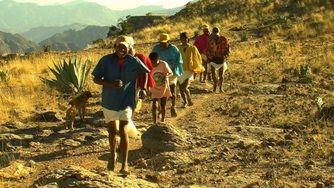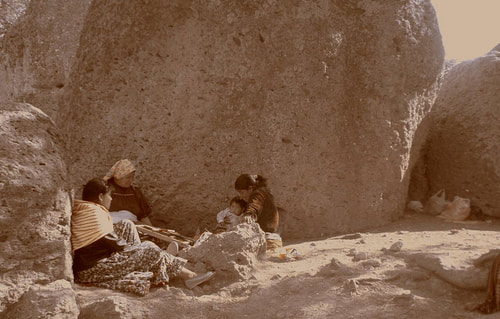You are here: Home / food / What You Can Learn from the Tarahumara July 8, 2011 By Yael Grauer12/4/2018 Nestled in the high plateaus of the Sierra Madre Mountains in Northern Mexico, there’s a tribe of exceptional endurance runners known as the Tarahumara. They call themselves the Rarámuri, or “running people,” and, in fact, long distance running is a part of who they are. The widely dispersed settlements and mountainous terrain they inhabit makes endurance running a necessity, but the Tarahumara have taken it to a whole new level, often running up to 500 miles a week. Tarahumara runners competed in the Leadville 100, an ultramarathon which is so challenging that less than half of its participants even complete the race. Tarahumara runners not only completed the race in 1992 and 1994, but won the event both times. In fact, the first place winner in 1992 was Victoriano Churro, a Tarahumara man who was 52 years old! In addition to their running prowess, the Tarahumara are also known for their good health. In fact, a relatively recent National Geographic study found nearly nonexistent levels of diabetes, vascular disease and colorectal cancer in tribe members tested. Similarly, a 1991 study in the New England Journal of Medicine shows stunningly low levels of high blood pressure and heart disease in those tested, as well as low total cholesterol and LDL. Naturally, one would wonder what the Tarahumara Indians eat. Their diet is largely plant-based, supplemented with small amounts of sheep, beef, goat and freshwater fish. It is not surprising that the Tarahumara eat this way. In fact, some of the benefits of a plant-rich diet include higher levels of certain vitamins, minerals, phytonutrients, anti-oxidants, and essential fatty acids. But it’s important to note that although some people choose a vegetarian or vegan diet for various reasons, it is not necessary to avoid meat completely to receive the health benefits of a plant- based diet. Simply increasing the amount of vegetables, legumes, nuts, seeds and fruits should do the trick. Although the Tarahumara do not eat a lot of meat, a 1979 study in the American Journal of Clinical Nutrition showed that their diet exceeded the UN’s recommended daily protein intake by more than 50%. This can be accomplished by focusing on protein-rich plant foods. Indeed, the Tarahumara eat plenty of beans, squash, chili peppers and wild greens, all foods with optimal amounts of protein (over 20%.) Here are some plant-based protein-rich options. Spinach (39% protein) Asparagus (34% protein) Broccoli (27% protein) Squash (24% protein) Artichokes (22% protein) Perhaps because of their massively high volume of exercise, the Tarahumara can handle higher amounts of whole grain carbohydrates (such as pinole, made out of corn) than I would typically recommend. Remember, the Tarahumara need to fuel their long distance running–often 70 miles a day!  Running such long distances year-round is rare in our culture. For those of us that are clocking in less than 500 miles a week, research indicates that high-carbohydrate diets used long-term can negatively affect both body fat percentage and insulin levels–especially if the carbohydrate sources are starchy, sugary and high on the glycemic index. However, properly timed higher carbohydrate meals can help maintain muscle and liver glycogen during periods of intense training, while still keeping insulin levels and body composition in check. Higher carbohydrate diets rich in starchy carbs (or maybe even unprocessed whole grains, if you must) three or four days before a long-duration endurance competition (such as a marathon) can improve performance by increasing stores of muscle and liver glycogen, leading to better athletic performance and preventing an energy crash when glycogen stores are depleted. So what can you learn from the Tarahumara? Bottom line: • Plant foods provide vitamins, minerals, phytonutrients, antioxidants and essential fatty acids. • If you do eat meat, supplement your diet with plenty of vegetables, nuts, seeds and fruits. • If you eat a plant-based diet, make sure you are eating protein-rich plant foods, especially green vegetables. • Training for long-duration endurance competitions (such as marathons) may require a higher carb intake for a short period of time.
2 Comments
3/10/2021 06:21:59 pm
Great content!! So much informative content you produce high quality of content which is good for those people can possible visit your site. It same like Haarlem Oil and Haarlem Oil for Horses (www.horses-haarlem-oil.com/product-category/shop) made by French people in France. I love the journey of my research from this website. Hope you do more blog post here about health. Thank you and God bless!
Reply
Leave a Reply. |
|
